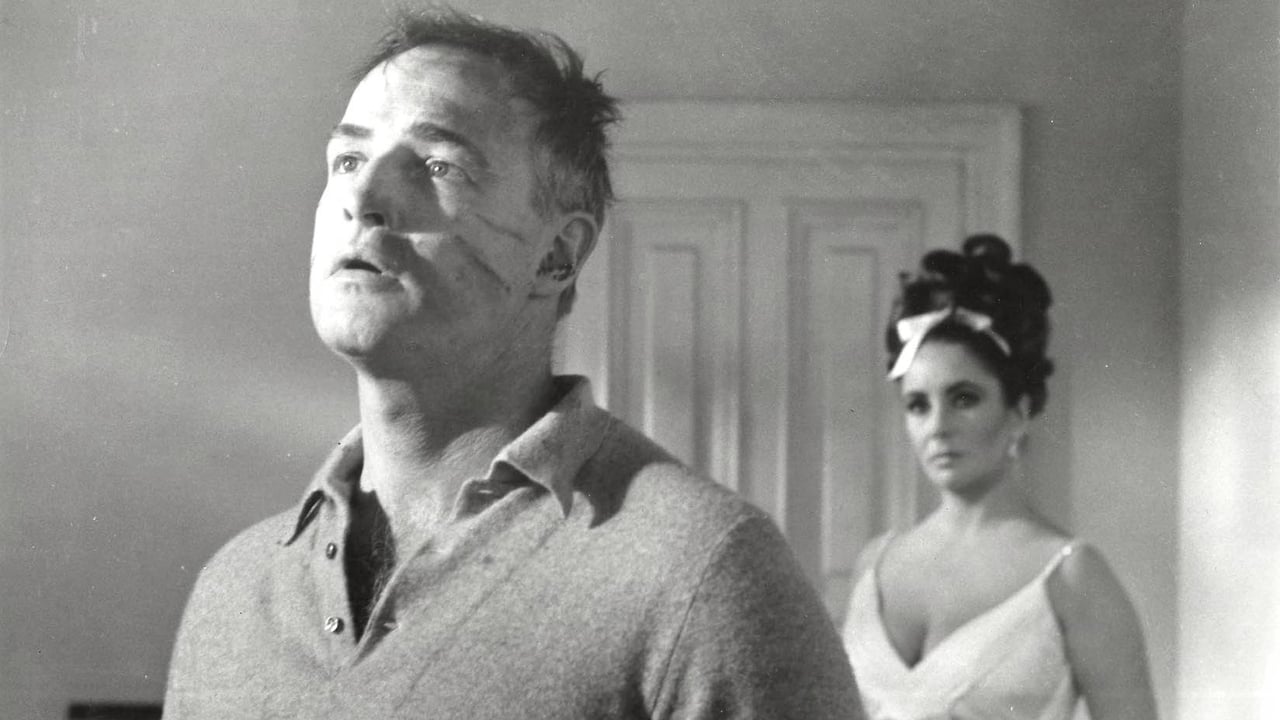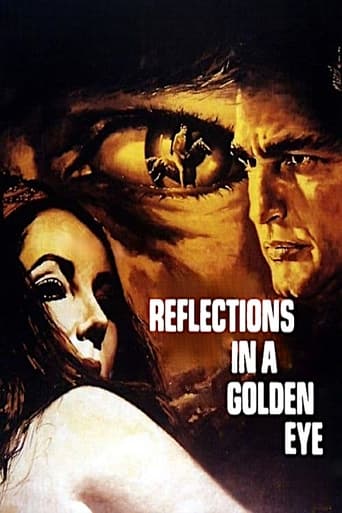

A Must See for Film Buffs and Historians. By the Time this Odd, Divisive Film was made the Stars Marlon Brando and Elizabeth Taylor had Careers that were Legendary.They were Seasoned Big Names and could Venture into Perversity in Pictures that were Considered Unacceptable (by the Code) for Mass Distribution. The same could be Said of Director John Huston.So with Unbridled Chutzpah They had at it. The Studio (WB) was Nervous. Ironically, the Film was Released with its Repressed Homosexuality and other Bizarre Sexual Peccadilloes Unedited. This Movie is Often Sighted as one of the Code Breakers and the Decision to Allow the Rating System, not the Repressed Urges of a Censorship Board to make the Choice.Along with Brando and Taylor the Supporting Cast is Excellent. Julie Harris and Brian Keith do Excellent Work and a One Film Wonder Zorro David is also Memorable in His Portrayal of an Outwardly Flamboyant and Gay Companion for the Mentally Ill Harris.It is Obviously Less Shocking Today but in 1967 the Film was Groundbreaking. The Slow-Burn, Melodramatic, Surreal Feel of the Film Divides Audiences and Critics. The Sexual Tension is at Times Frustrating because it Never Fully Ignites Until the Controversial, Over the Top Final Scene.Huston Sights this as One of His Favorites and would be Pleased with the Recent Restoration of His Vision of a Golden Hue that Washes Out All of the Color, Except for RED. With Respect, the Decision was Ill Advised. The Studio and the Initial Reaction and Premiere Audience Voiced Objection so the Movie was Pulled and the Typical Color Reinstated. Recent Disc Releases uses Huston's Version. Although Symbolic, after awhile it becomes Rather Mundane and Monotonous.Overall, the Movie is so Strange and Compelling it is Worth a Watch for Fans of the Stars, the Director and for Taking a Chance on these Characters when others were Complacent or Outright Hostile to Change and Punished Anyone who Dared to be Different. The Times were a Changin.
... View MoreA US Army base somewhere in the South, late-1940s/early-1950s. A quiet, relatively unimportant base, it is the model of serenity. On this base we have Major Weldon Penderton (played by Marlon Brando), a lecturer in military tactics and strategy. He's married to Leonora (Elizabeth Taylor). There's also Lt. Colonel Morris Langton (Brian Keith) and his wife Alison (Julie Harris). On the surface, everything appears normal and uneventful. However, dig a bit deeper and you'll see that there is no passion in the Pendertons' marriage - they barely tolerate each other. Mrs Penderton is having an affair with Lt. Col. Langton. Mrs Langton has mental issues. Then there's the strange, voyeuristic, repressed Private Williams (Robert Forster)...Directed by John Huston, starring Marlon Brando and Elizabeth Taylor. Three icons of movie making - surely a recipe for success? Well, not entirely.Slow moving, with brief sparks of intrigue. this movie never kicks into a higher gear. It was never entirely boring but never fully engaging either. The movie seemed set up for a profound ending but the ending was reasonably predictable and inevitable.While there are some decent themes, especially involving repression of feelings and desires, these are never explored too thoroughly. Interesting enough, but not overly engaging or satisfying.Solid performances by Marlon Brando, Elizabeth Taylor, Brian Keith, Julie Harris and Robert Forster. On the negative side we have the character Anacleto, played by Zorro David. An incredibly badly and irritatingly drawn character, badly played with dialogue badly dubbed.
... View MoreDuring the mid 1960s there was a movie called "The Love One" that was billed as "The Movie With Something to Offend Everyone". Released during that same era, "Reflections in a Golden Eye" might well have been billed as "The Movie With Something to Disgust Everyone". That is because there is undoubtedly something in this jaw-dropping movie that will make every single member of the viewing audience squirm in their seats at some point or other, regardless of their age, gender or sexual proclivities. Adultery, homosexuality, sadomasochism, bestiality, voyeurism, self-mutilation, cruelty to animals, murder, those are just a few of the things that go on here. Ostensibly the story takes place on an Army base somewhere in the southern United States. Actually, however, it takes place in some bizarre and perverse parallel universe where Tennessee Williams meets The Twilight Zone. Certainly if the U.S. Army bears even the slightest resemblance to what is depicted in this movie than the country is in a whole lot of trouble.The plot revolves around two Army officers and their respective wives, who are best friends and next-door neighbors on an Army Base. By far the most normal of the four characters is that played by Brian Kieth, who is merely committing adultery with his best friend and next-door neighbors's wife. But hey, can you blame him when his friend's wife is a very-willing Elizabeth Taylor? Besides, Kieth's own wife, who had suffered a miscarriage a few years earlier, hasn't had any use for him since. Played by Julie Harris, Kieth's wife is definitely what a Harley Street Psychiatrist would label, clinically speaking, "Barmy". For her role Liz comes across like a combination of Scarlett O'Hara and Martha from "Who's Afraid of Virginia Woolf?". It's not very surprising that she is having an affair with her neighbor because her own husband, played by Brando, is a closet case, and she obviously knows it. They're just your typical well-adjusted American couple; she has complete contempt for him while he absolutely loathes her. So, while Liz is having it off with Kieth while Brando is out stalking enlisted men around the Army Base. Watching this movie one can't help wondering, if this is how things are in the Army, what can it possibly be like in the Marine Corps?"Reflections in a Golden Eye" is meant to be an adult drama. However, everything about the film is so extremely over-the-top that the only way to enjoy it at all is to view it as if it were some sort of parody. In that sense it is somewhat reminiscent of "The Fountainhead", another dramatic movie that can only really be enjoyed if it is viewed as a comedy.
... View MoreThis movie isn't for everybody. Huston, Taylor, Brando and the rest of the cast took some serious artistic risks back in 1967, and a lot of people didn't like the product; 50 years on, a lot of people still won't. If one comes to it cold, hearing only that it is only a movie about "a closeted homosexual in the military", which is true of the Brando character, and expects some kind of serious dramatic narrative experience - like for example in "The Sergeant" which also came out in 1968 - the approach of "Reflections", which I think is not unlike that of a Beckett play, will be a surprise, and one might say, "this is a weird movie - it's not a good drama." But I believe that would be a mistake. I don't mean that one kind of approach is "better" than the other, only that different kinds of movies with different kinds of artistic excellence as their goals shouldn't be measured by the same yardstick.The action of this film is pretty much indifferent to place and setting; it doesn't need to be in the South and it doesn't need to be on a military base. It is sometime in the period from 1945-1960 when people of privilege spent their evenings at each other's houses, playing cards and drinking way more hard liquor than today. In fact the time and setting blurred in my view into a sort of dreamlike background, not demanding to be like a real place or time.There are two military officers. There are their wives, whose thwarted lives are filled by avocations and disorders - sex, alcohol, and horsewomanship, or art, classical music, and depression. Their wives have admirers. One is the enlisted man played by Robert Forster, who elicits and then upsets one category after another. Another is the Filipino servant played by Zorro David (his only movie ever) with flamboyant swishiness, but is he really gay or are we being tempted to overassume? It's only what we see and judge, and neither can be trusted.All have secrets, concealing who they really are while trying to figure out who the other people are, sometimes successfully, more often not. People read people and situations incorrectly and act upon their bad understanding and send the activity off in another direction. When people think they are unobserved they act much differently, comforting themselves in ways that are not provided for in the conventions that surround them. To borrow the thoughts of a character, they are all square pegs trying to deal with the round holes they have been hammered into by others or themselves.And if that all reads sort of like the universal experience of people, that's sort of the point, I think.I don't think it's perfect, but every time I try to pick a flaw I start to wonder if the artists didn't intend it just that way for a reason. Some detractors have noted that the Brando character's accent is just incomprehensible at times - I turned on closed captioning eventually. But then at one of those times he was giving instructions to a subordinate, who then doesn't carry them out properly, so was this on purpose? I didn't understand why the frenzied camera work in the final scene was done that way either. But was it meant to convey something? These people are not easily dismissed.
... View More